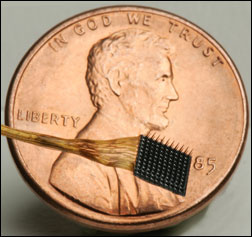Neural Interface Progress
Cyberkinetics Neurotechnology Systems, Inc. presented results of clinical trials of the BrainGate Neural Interface System at the American Society of Stereotactic and Functional Neurosurgery (ASSFN) Biennial Meeting on Sunday, June 4, 2006, in Boston, Massachusetts.
"The results from the third participant are particularly significant because we have begun to replicate the intuitive control of a computer mouse," stated John P. Donoghue, Ph.D., a founder and Chief Scientific Officer of Cyberkinetics and Director of the Brain Science Program at Brown University. "Such control, including the ability to 'stop' the computer cursor, for example, is directly related to a person's ability to stop other electronically controlled devices, such as a motorized wheel chair."
The third participant in the trial, who cannot speak due to a stroke, has been able to use the Braingate interface to move and stop a cursor on the computer screen. They have been able to type messages through the neural interface and software using only their thoughts.
"This pilot trial continues to indicate that an implantable brain-computer interface can one day provide an operating system for patients with severe disabilities", added Tim Surgenor, President and Chief Executive Officer of Cyberkinetics, "We now have a clearer idea of the hardware and software challenges involved in moving forward... as well as moving toward more compact, fully implantable, wireless devices."
So far, three patients have successfully been implanted with the interface and been able to interface with a computer through the neural connection.
Cyberkinetics - Neurotechnology Systems, Inc.

"The results from the third participant are particularly significant because we have begun to replicate the intuitive control of a computer mouse," stated John P. Donoghue, Ph.D., a founder and Chief Scientific Officer of Cyberkinetics and Director of the Brain Science Program at Brown University. "Such control, including the ability to 'stop' the computer cursor, for example, is directly related to a person's ability to stop other electronically controlled devices, such as a motorized wheel chair."
The third participant in the trial, who cannot speak due to a stroke, has been able to use the Braingate interface to move and stop a cursor on the computer screen. They have been able to type messages through the neural interface and software using only their thoughts.
"This pilot trial continues to indicate that an implantable brain-computer interface can one day provide an operating system for patients with severe disabilities", added Tim Surgenor, President and Chief Executive Officer of Cyberkinetics, "We now have a clearer idea of the hardware and software challenges involved in moving forward... as well as moving toward more compact, fully implantable, wireless devices."
So far, three patients have successfully been implanted with the interface and been able to interface with a computer through the neural connection.
Cyberkinetics - Neurotechnology Systems, Inc.

0 Comments:
Post a Comment
Subscribe to Post Comments [Atom]
<< Home